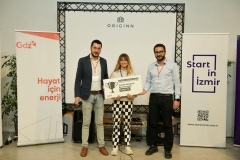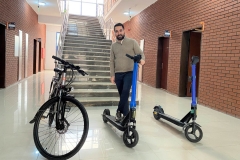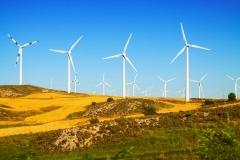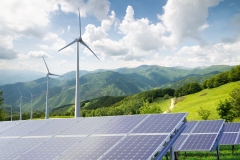
GRADUATE SCHOOL
Sustainable Energy (Without Thesis)
SEN 501 | Course Introduction and Application Information
| Course Name |
Natural Resources Management
|
|
Code
|
Semester
|
Theory
(hour/week) |
Application/Lab
(hour/week) |
Local Credits
|
ECTS
|
|
SEN 501
|
Fall/Spring
|
3
|
0
|
3
|
7.5
|
| Prerequisites |
None
|
|||||
| Course Language |
English
|
|||||
| Course Type |
Elective
|
|||||
| Course Level |
Second Cycle
|
|||||
| Mode of Delivery | - | |||||
| Teaching Methods and Techniques of the Course | - | |||||
| Course Coordinator | ||||||
| Course Lecturer(s) | ||||||
| Assistant(s) | - | |||||
| Course Objectives | The aim of this course is to provide fundamental level information on both renewable and non-renewable energy sources, with special focus on production technologies and sustainable operation of energy systems. |
| Learning Outcomes |
The students who succeeded in this course;
|
| Course Description | This advanced course is designed to analyze energy generation and sustainability from an innovative perspective |
|
|
Core Courses | |
| Major Area Courses | ||
| Supportive Courses | ||
| Media and Management Skills Courses | ||
| Transferable Skill Courses |
WEEKLY SUBJECTS AND RELATED PREPARATION STUDIES
| Week | Subjects | Related Preparation |
| 1 | Introduction to Energy | Yarman, T. (2009). "Enerji Kaynakları". İstanbul : Okan Üniversitesi Yayınları. ISBN-ISSN: 978-605-5899-03-5. |
| 2 | Energy Units and Conversion | Yarman, T. (2009). "Enerji Kaynakları". İstanbul : Okan Üniversitesi Yayınları. ISBN-ISSN: 978-605-5899-03-5. |
| 3 | Fossil Fuels: Oil | Yarman, T. (2009). "Enerji Kaynakları". İstanbul : Okan Üniversitesi Yayınları. ISBN-ISSN: 978-605-5899-03-5. |
| 4 | Fossil Fuels: Coal | Yarman, T. (2009). "Enerji Kaynakları". İstanbul : Okan Üniversitesi Yayınları. ISBN-ISSN: 978-605-5899-03-5. |
| 5 | Fossil Fuels: Natural Gas and Non-Conventionals | Yarman, T. (2009). "Enerji Kaynakları". İstanbul : Okan Üniversitesi Yayınları. ISBN-ISSN: 978-605-5899-03-5. |
| 6 | MIDTERM | |
| 7 | Renewables: Wind | Dieter Seifried and Walter Witzel (2010). "Renewable Energy". ISBN-ISSN: 9781849775298. |
| 8 | Renewables: Solar | Dieter Seifried and Walter Witzel (2010). "Renewable Energy". ISBN-ISSN: 9781849775298. |
| 9 | Renewables: Hydro power | Dieter Seifried and Walter Witzel (2010). "Renewable Energy". ISBN-ISSN: 9781849775298. |
| 10 | Renewables: Geothermal | Dieter Seifried and Walter Witzel (2010). "Renewable Energy". ISBN-ISSN: 9781849775298. |
| 11 | Renewables: Biomass and Biofuel | Dieter Seifried and Walter Witzel (2010). "Renewable Energy". ISBN-ISSN: 9781849775298. |
| 12 | Hydrogen Energy | Dieter Seifried and Walter Witzel (2010). "Renewable Energy". ISBN-ISSN: 9781849775298. |
| 13 | Nuclear Energy | Charles D. Ferguson (2011). "Nuclear Energy". New York, N.Y. : Oxford University Press. ISBN-ISSN: 9780199792450. |
| 14 | Sustainable Energy Systems | Jefferson W. Tester [et al.] (2005). "Sustainable energy: choosing among options". Cambridge, Mass. : MIT Press. ISBN-ISSN: 0-262-20153-4. |
| 15 | Sustainable Management on Energy Systems | Jefferson W. Tester [et al.] (2005). "Sustainable energy: choosing among options". Cambridge, Mass. : MIT Press. ISBN-ISSN: 0-262-20153-4. |
| 16 | Review of the semester |
| Course Notes/Textbooks | Parts from book that mentioned above and PowerPoint presentations. |
| Suggested Readings/Materials |
EVALUATION SYSTEM
| Semester Activities | Number | Weigthing |
| Participation |
1
|
10
|
| Laboratory / Application | ||
| Field Work | ||
| Quizzes / Studio Critiques | ||
| Portfolio | ||
| Homework / Assignments | ||
| Presentation / Jury |
1
|
15
|
| Project | ||
| Seminar / Workshop | ||
| Oral Exams | ||
| Midterm |
1
|
25
|
| Final Exam |
1
|
50
|
| Total |
| Weighting of Semester Activities on the Final Grade |
3
|
50
|
| Weighting of End-of-Semester Activities on the Final Grade |
1
|
50
|
| Total |
ECTS / WORKLOAD TABLE
| Semester Activities | Number | Duration (Hours) | Workload |
|---|---|---|---|
| Theoretical Course Hours (Including exam week: 16 x total hours) |
16
|
3
|
48
|
| Laboratory / Application Hours (Including exam week: '.16.' x total hours) |
16
|
0
|
|
| Study Hours Out of Class |
15
|
5
|
75
|
| Field Work |
0
|
||
| Quizzes / Studio Critiques |
0
|
||
| Portfolio |
0
|
||
| Homework / Assignments |
0
|
||
| Presentation / Jury |
1
|
30
|
30
|
| Project |
1
|
0
|
|
| Seminar / Workshop |
0
|
||
| Oral Exam |
0
|
||
| Midterms |
1
|
42
|
42
|
| Final Exam |
1
|
30
|
30
|
| Total |
225
|
COURSE LEARNING OUTCOMES AND PROGRAM QUALIFICATIONS RELATIONSHIP
|
#
|
Program Competencies/Outcomes |
* Contribution Level
|
||||
|
1
|
2
|
3
|
4
|
5
|
||
| 1 | To improve theoretical and conceptual proficiencies as well as applied competencies on energy studies. | |||||
| 2 | To evaluate the problems and circumstances about energy systems by using theoretical and practical knowledge in fundamental disciplines of energy studies such as economics, natural sciences, political science, law, and sociology. | |||||
| 3 | To analyze multi-dimensional problems which are faced and unpredicted in energy system by taking over responsibility as an individual and a group member. | |||||
| 4 | To evaluate the relationships between factors in energy policies and applications such as structures, markets, institutions, regulations, climate change and environment in a critical perspective. | |||||
| 5 | To debate problems in sustainable energy development by identifying them. | |||||
| 6 | To argue positive and negative aspects of international affairs and geopolitics on energy. | |||||
| 7 | To examine the economic and political structure that energy systems are based on. | |||||
| 8 | To question the theoretical and empirical gaps in energy studies literature by developing original arguments in order to fill these gaps in the literature. | |||||
| 9 | To interpret the collected data that would measure the theories, scenarios and concepts as variables by using scientific research methods in energy sciences and sustainable energy development field. | |||||
| 10 | To prepare an original thesis/term project about political, economic, environmental, social and/or historical dimensions of sustainable energy and geopolitics in accordance with scientific criteria. | |||||
| 11 | To develop foreign language skills to be able to follow the literature on energy studies and to communicate with international scholars. | |||||
| 12 | To be able to use data and information in advanced levels in the field of energy sciences. | |||||
| 13 | To have ethical, social and scientific values in the stages throughout the processes of collecting, interpreting, disseminating and implementing data relevant to energy studies. | |||||
*1 Lowest, 2 Low, 3 Average, 4 High, 5 Highest
NEWS |ALL NEWS

‘Double award’ for energy efficiency
Izmir University of Economics (IUE) received a double award at the ‘Innovative Idea Development Workshop in the Electricity Distribution Sector’ organized with

International investment for ‘Scootable’
Emrecan Durmaz, a student of Izmir University of Economics (IUE), who developed the software infrastructure that enables electric scooters and bicycles to

‘Social' analysis of energy’
Prof. Dr. Mehmet Efe Biresselioğlu from Izmir University of Economics (IUE) has implemented the ‘Cure’ project with 2 countries to measure the

